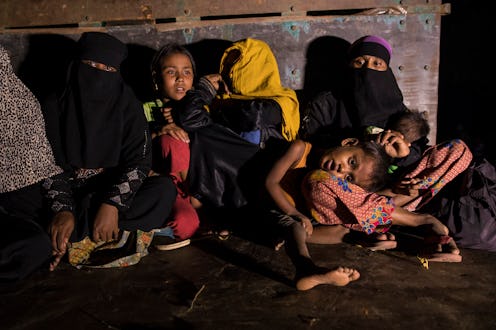News
Myanmar & Bangladesh Sign A Deal Allowing Rohingya Muslims To Return

Hundreds of thousands of Rohingya Muslim refugees from Myanmar have been seeking refuge in Bangladesh for the last several months. Since August, when the violence broke out, as many as 620,000 Rohingya have crossed the border. But now, Bangladesh and Myanmar have worked out a return deal that would see the refugees go back to their homes. The only problem is that the biggest human rights organization working in the region is skeptical about the agreement's ability to keep these people safe.
The Rohingya are a minority in Myanmar, the southeast Asian country often called Burma, and they are not recognized by the government. The refugees fled from a military crackdown in their region of the country that Secretary of State Rex Tillerson has called ethnic cleansing. As a result, the UNHCR and NGOs like Amnesty International have said assurances need to be made that the Rohingya will be protected back in Myanmar. Amnesty International’s Director for Refugee and Migrant Rights Charmain Mohamed said;
Talk of returns is clearly premature at a time when Rohingya refugees continue to trickle into Bangladesh on an almost daily basis as they flee ethnic cleansing in Myanmar. There can be no safe or dignified returns of Rohingya to Myanmar while a system of apartheid remains in the country, and thousands are held there in conditions that amount to concentration camps. Returns in the current climate are simply unthinkable.
Mohamed points out that Myanmar and Bangladesh have "clear obligations under international law" not to send back the Rohingya to persecution or serious human rights violations.
The system of apartheid that he speaks of is the country's citizenship law that was passed in 1982 by the military junta that solely controlled the country from 1962 to 2010. It reserves citizenship for certain groups of Burmese based on race. "Access to citizenship is primarily based on race, and excludes certain races and ethnic groups," a UK-based Burmese Rohingya organization explains in a briefing. The Muslim Rohingya are the largest group excluded. The main ethnic group in the country is the Burman or Bamar people, who are Buddhist.
Since August, there have been reports of the Burmese military razing villages, carrying out mass rapes, and more atrocities in Rakhine state, the main area of Myanmar where the Rohingya live. That was in response to deadly attacks on police posts by Rohingya rebels, but the response by the military has been huge based on reports by journalists in the area, the United States, and the UN. The Myanmar government has denied the reports of ethnic cleansing and genocide to the UN.
In part because Bangladesh is majority Muslim, the Rohingya fled there. That has in turn led to a problem for the Bangladeshi government; there were already 400,000 Rohingya living there, and they're worried the local population will not appreciate such a large influx. Thus the agreement for their return.
It's supposed to start within two months according to the Bangladeshi government and is based on a 1992-1993 agreement between the two countries, a similar situation arose at the time. Under the agreement, people will be admitted to return to Myanmar with documents that were issued in the past. The civilian government of Aung San Suu Kyi has said that residency will be used to let back in the Rohingya, given that they're not citizens.
But the military, who still controls much of Myanmar has been less keen to take back any Rohingya. Myanmar's military chief Min Aung Hlaing said last week it was impossible to take the numbers that Bangladesh wants to send. "The situation must be acceptable for both local Rakhine ethnic people and Bengalis, and emphasis must be placed on wish of local Rakhine ethnic people who are real Myanmar citizens," Min Aung Hlaing also said (essentially saying the Rohingya are not).
This mixed message has plenty worried. In addition to Amnesty International, Rohingya activist Nay San Lwin told Al Jazeera that he is worried about how the returnees will be treated and that they may not be returned to their original villages. "It looks like they will be placed in the temporary camps, and later the refugees will be locked up in the camps for a long time," he told the news site.
In addition, only about 300 will be repatriated per day, which could mean that bringing back all the refugees could take years.